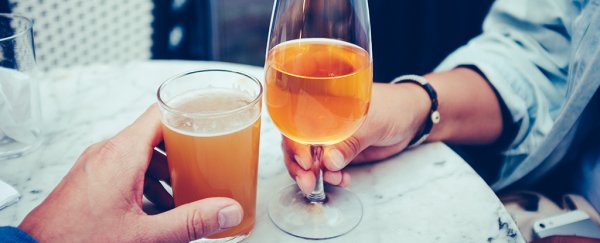Drinking booze after learning new information can help our brains store away what we took in when we were still sober, according to new research, even though alcohol is traditionally linked to problems forming memories.
The word-learning task given to the study participants sheds some more light on the way alcohol affects memory, and the way the brain stores information in general, though we wouldn't recommend getting drunk every time you've got something new to remember.
According to the team from the University of Exeter in the UK, the research backs up previous studies carried out in the lab, but this time in a natural setting where participants were drinking in their own homes.
"Our research not only showed that those who drank alcohol did better when repeating the word-learning task, but that this effect was stronger among those who drank more," said one of the team, Celia Morgan.
Before you order in a crate of beer for your next exam session, you might want to dig deeper into the findings – it seems that when alcohol intake blocks the short-term memory circuits in the brain, long-term memories can then be consolidated.
So after a few drinks, you stop taking in any new information, which means anything you learned earlier in the day has more chance to take root.
For the purposes of the study, 88 social drinkers were tested on a word-learning task, then split into two groups at random.
One group was told to drink as much as they liked – the average was four units, or around two glasses of wine – and the other group was told not to drink at all.
The next day the word-learning task was revisited, and those who had been drinking remembered more of what they'd learned the day before.
"The theory is that the hippocampus – the brain area really important in memory – switches to consolidating memories, transferring from short into longer-term memory," says Morgan.
In other words a session on the booze means the hippocampus has no new information to encode, so it busies itself with encoding older information instead.
The volunteers were also asked to complete a task looking at images on a screen, once right after drinking or staying sober, and once the next day.
Those who had been drinking performed the same on the image task in the two sessions, so this super-powered memory saving only seems to work for information absorbed before a boozing session.
The researchers are keen to stress that the study should only be considered in the context of what we already know about alcohol: that too much of it can seriously harm your memory and health over the long term.
Another point the team makes is that sleep may have had some impact on locking in memories overnight, something which future studies could look into.
That said, it's an interesting analysis of both alcohol's impact on the brain and the way our brains lock away information we need to keep hold of.
"Rather than the wholly negative effect that alcohol is presumed to have on memory, this study suggests that there may be some subtle enhancing effects, that may be informative in future for developing novel pharmacotherapies and tailored cognitive enhancing interventions," conclude the researchers.
The findings have been published in Scientific Reports.
